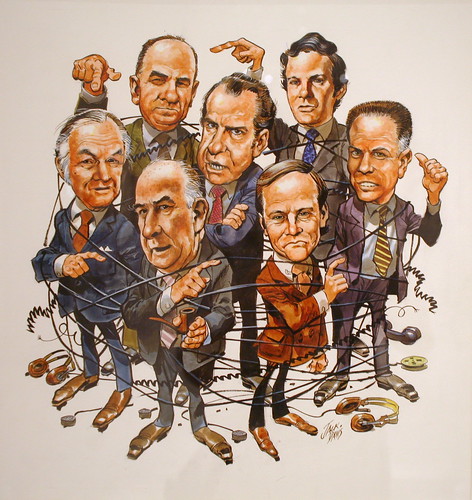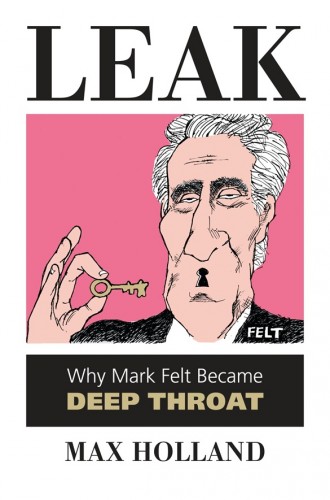
Richard Nixon, Time cover April 30, 1973, “The Watergate Scandal”
courtesy of cliff1066�
On Friday, March 16, join author Max Holland for a look at Mark Felt, the FBI official behind “Deep Throat,” the secretive whistleblower of the Watergate scandal. Holland will be speaking at the International Spy Museum from noon until 2 p.m. on his latest book, Leak: Why Mark Felt Became Deep Throat.
Best known through Hal Holbrook’s portrayal in the film version of Bob Woodward and Carl Bernstein’s All the President’s Men, Felt was regarded for decades as a conscientious but highly secretive whistleblower who shunned the limelight. Yet even after he finally revealed his identity in 2005, questions about his true motivations persisted.
Max Holland has found the missing piece of that Deep Throat puzzle—one that’s been hidden in plain sight all along. He reveals for the first time in detail what truly motivated the FBI’s number-two executive to become the most fabled secret source in American history. In the process, he directly challenges Felt’s own explanations while also demolishing the legend fostered by Woodward and Bernstein’s bestselling account.

Max Holland is editor of the website Washington Decoded, contributing editor to the Wilson Quarterly and The Nation, and author of The Kennedy Assassination Tapes: The White House Conversations of Lyndon B. Johnson Regarding the Assassination, the Warren Commission, and the Aftermath. He received the J. Anthony Lukas Work-in-Progress Award for a forthcoming book on the Warren Commission. Holland took a moment to discuss the book and his research.
In your book you indicated you were not a “real time” Watergate buff, but after catching up became more fascinated with the journalistic angle. Could you elaborate on that?
I was a “real time” buff in the sense that I watched with rapt attention the entirety of the Ervin Committee hearings in the spring/summer of 1972. Afterwards, though, I read none of the histories and memoirs— or even All the President’s Men (although I did see the movie naturally).
My interest in the matter was rekindled when I read in the Washington Post in 2007 that Woodward and Bernstein had sold their papers to the Ransom Center in Austin, Texas. I thought to myself, “Hmm, I wonder what’s in them that we don’t know already.” Because I realized from long experience researching archives that they invariably reveal a history different from the one widely accepted.
The more I researched and the more I read, I realized that Mark Felt’s alleged motives made no sense, that the explanations offered to date were suspect.

Bob Woodward
courtesy of cliff1066�
Do you feel that Watergate has affected the nature of the press to this day?
There is no doubt that it has, though historians of American journalism are better able to describe this phenomenon than I am. (One good book is Jon Marshall’s Watergate’s Legacy and the Press). Certainly, Watergate affected generations of reporters in how they cover the presidency if not Washington in general, and perhaps not all to the good. One reason I wanted to write the book is that I don’t think it’s a healthy situation when the widely-accepted version of what happened is, in fact, a fairy tale.
What media outlets do you feel have the important official’s ear now?
The New York Times remains pre-eminent I think, but I might be old-fashioned. For news that is purely political Politico.com is up there. But these days it matters less where a story appears than what it has to say.
CNN’s Matt Welch has linked LEAK: Why Mark Felt Became Deep Throat with Warren Buffett and his relationship with the press and President Obama. What are your feelings on the comparison?
One of the oddities that come with writing a book is watching people use it for their own purposes (or columns). I’m all for examining the motives of sources . . . and watching what they do as opposed to what they say (to put a twist on an old John Mitchell saying). But Welch’s column was, to put it politely, a stretch.
How important do you feel this information is to the students of journalism today?
Any history that gives budding journalists a firmer grip on reality is good.
As that world evolves into the digital landscape, do you believe there is an economy for the kind of reporting generally thought vital to the functioning of a democracy?
An economic basis for what’s called investigative journalism has to be found; otherwise we are going to be in big trouble. As it is, the media are usually fighting a rear-guard action, exposing wrong-doing only after it has already been done.
Join Max Holland at the International Spy Museum from noon to 2 pm on Friday, March 16. Tickets are free. The museum is located at 800 F Street, NW, in Penn Quarter and is located one block from the Chinatown/Penn Quarter Metro stop, serving the Red, Green, and Yellow lines.
Interview and content assistance gratefully received from Allison Bishop, International Spy Museum.




It is interesting to an observer that old stories are being dredged up to maintain the myth that Nixon was a bad person when he did the almost impossible and made the most important strategic Foreign Policy changes that have made the world unrecognisable.
Nixon’s historic trip to China 40 years ago is being submerged in a raft of stories designed to perpetuate the myth that had been generated about Nixon. The often repeated cop out is that there is a mountain of documents to wade through such that the observer has to reply on the writings of those who stand to benefit only if they kept to the well-worn political line. Are we missing the wood for the trees? Is this a deliberate mis-direction? I have read many such books and it is my opinion that the direct quotations of Nixon are open to very different interpretations. He is a very complex man. Which great leader was not a complex person? Of course the meme that Nixon is a bag egg has been popularised and who would dare to be unconventional and go against the grain and risk being labeled a laughing stock? Especially when one’s career is on the line.
Why do we not think for ourselves and question the inconsistencies and contradictions in the official story? After all we are supposed to have been taught to do so in our schooling.
Why would Nixon order a raid on Watergate when he was already 26 points ahead of Senator McGovern?
Why did the Watergate raiders persist in a risky and dumb project so that they would be arrested at the THIRD attempt?
Why did the dollar bills found on the arrested raiders have consecutive serial numbers? How was this observation made and who popularised it?
Why were H Hunt’s details that led to the White House found on the address books of TWO of the four arrested Cubans?
The raiders were supposed to be ex-CIA; why were they so incompetent?
What has Richard Dawkin’s memes got to do with Watergate?
If Nixon had wanted to order the Watergate raid, why did he pass the FEC Act that brought about greater transparency in campaign funding? It was not perfect but was a step in the right direction.
Nixon was against the Zionist lobby influencing US Foreign Policy in the Middle East. Was this another reason for his downfall? Another accusation is that Nixon was anti-Semitic.
Although anti-bussing, he was responsible for the desegregation of the Southern States, a carry over from President Johnson. He appointed Connolly, a Democrat to be his Secretary of Treasury and Kissinger who was an advisor to Rockefeller.
He formed the Environmental Agency, thus he was years ahead of his time.
He alone among the political elite wanted to withdraw from Vietnam not at any price but though ‘Peace with Honour’. He did end the Vietnam War; the principal cause of all the trouble of the US in the 60s and 70s.
He was right wing, but a patriot, doing everything for the US of A, the country that he loved.
It is my hypothesis that the Watergate plot was a right wing false flag operation that the liberals would run with, once the trap was sprung. http://uftpress.com. Have we been hoodwinked for so many years? Can someone please explain the contradictions and inconsistencies of the official STORY and conventional account to me?
Pingback: CARTUCCE EPSON SERIE 711,CARTUCCE EPSON SERIE 712,CARTUCCE EPSON SERIE 713,CARTUCCE EPSON SERIE 714